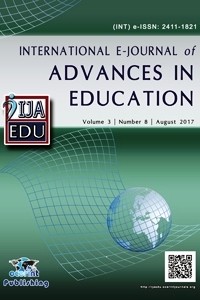
International E-Journal of Advances in Education
Yazarlar: Eva Ohbaya HASSAN
Konular:Eğitim, Eğitim Araştırmaları
DOI:10.18768/ijaedu.616006
Anahtar Kelimeler:Arabic language learners,Native Japanese speakers,Standard Arabic,Adverbs,Verbs.
Özet: There is an unmistakable upward trend in the population of Japanese-speaking learners of Arabic, reflecting the population growth of native Arabic speakers and recognition of the importance of Arabic languages and cultures as a field of study. The eagerness of Arab corporations to engage in business with Japanese organizations also continues to expose an increasing number of Japanese speakers to nations and cultures of the Arab world. Other reasons include growing attention on the Arab world’s important role in international society. All of these factors have contributed to a heightening of interest in Arabic language learning among Japanese speakers. The aim of this study is to investigate Arabic narration by native speakers of Japanese, primarily focusing on adverbial expressions that were used by Japanese-speaking learners when they were asked to narrate events depicted in the picture book, ‘The Frog Story’. This paper first identifies three Arabic adverbial clause types, classified based on morphosyntactic and functional differences. This is followed by an examination of the different ways in which the learners’ narrations of the events were coded via adverbial expressions and verbs. The first type of adverbial expression is what in Arabic is known as alħa:l^l-mufrad or the ‘accusative adverb’, which for the purpose of this paper is referred to as the ‘noun/participle adverb’. This phrase type comprises a verb participle combined with an accusative case and containing no tense information. An exciting conclusion of this study is that Japanese learners of Arabic tend to utilize this adverb type more frequently than native Arabic speakers do. The second type of adverbial expression, known in Arabic as jumlatu^l-ħa:l or the ‘adverbial sentence’, is referred to as the ‘explicit subject adverbial clause’ in this paper. This clause type comprises a conjunctive particle, a subject pronoun, and a verb. The verb is always imperfect, and the subject need not be coreferential with the main clause subject. Results of this study indicate that Japanese learners of Arabic tend to use this adverbial clause type less frequently compared to native Arabic speakers. This may be due to learners not being aware that the subject of the adverbial clause need not be coreferential with the main clause subject. The third type, also known as the ‘adverbial sentence’, is referred to as the ‘non-explicit subject adverbial clause’ in this paper. This clause type consists of only a verb in the imperfect tense, and has neither a conjunctive particle nor a pronominal subject. This clause type was not found in the learners’ narrations, suggesting that the learners are not familiar with the fact that this kind of clause even exists in Arabic.